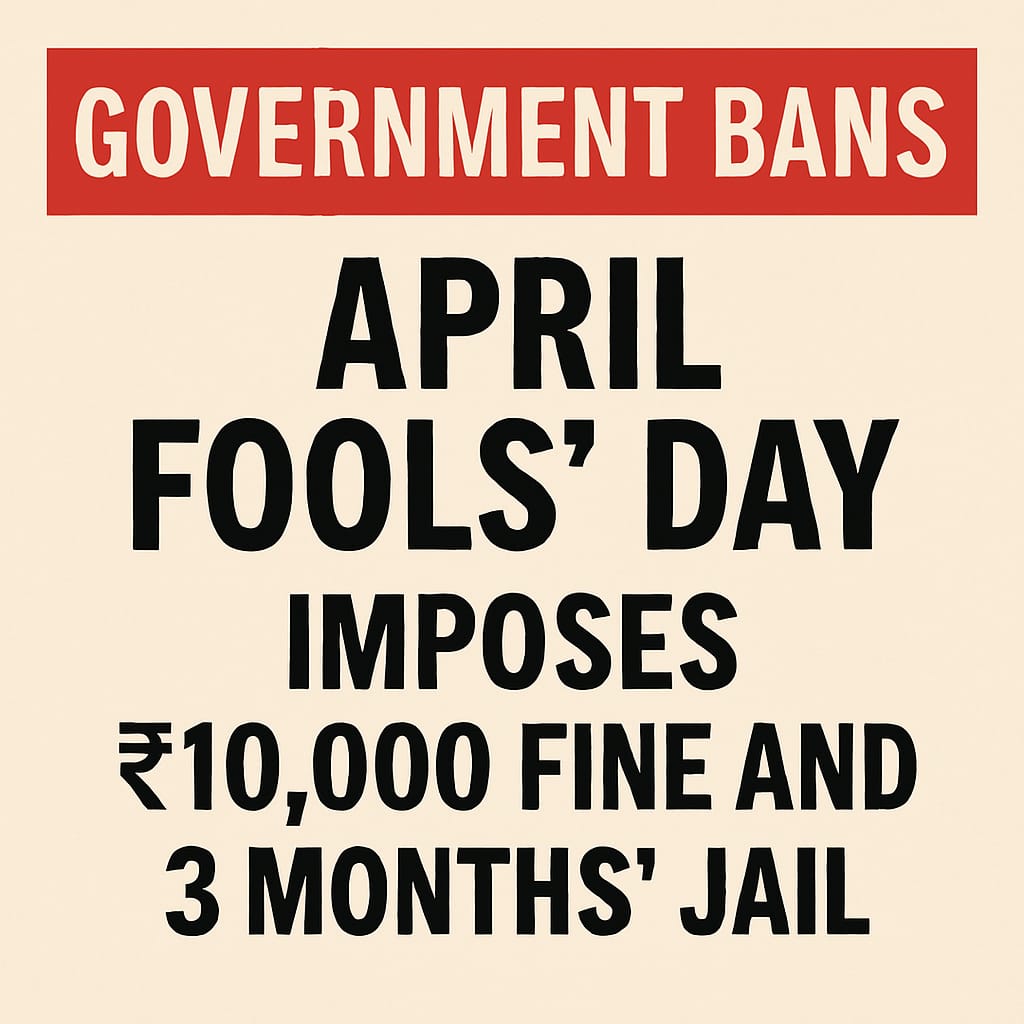Govt. Imposes Rs 10,000 Fine & 3 Months Jail for Celebrating April Fools' Day in Schools
By Madhurie Singh, March 31, 2025

Imagine this: your child pulls a harmless prank on April 1st, and suddenly, the school principal shows up with a stern warning. “Did you know, that celebrating April Fools’ Day could land you with a hefty fine and jail time?” You’re shocked, confused, and maybe even a little worried. Could this be true? Could something as innocent as playing pranks lead to a legal penalty? If you’ve never heard of such a law, you’re not alone. But the truth might be more shocking than you think. Is the government really cracking down on April Fools’ Day? Read on to find out why this seemingly harmless tradition could get you in serious trouble, and the hidden history behind it.
The True Reason Behind April Fools’ Day
Before you panic, take a deep breath. There is no law banning April Fools’ Day in Indian schools—at least not in the way it’s being made to sound. But the origin of this day does have a surprising connection to the past, one that involves a Roman king, Pope Gregory XIII, and a dramatic shift in how the world measured time.
The celebration of April Fools’ Day actually traces back to 1582, when Pope Gregory XIII introduced a new calendar system known as the Gregorian Calendar.
Before this change, the Julian Calendar (used by the Romans) was the standard. According to the Julian Calendar, the new year began around April 1st, which is why ancient Romans celebrated the start of their year on that date. However, this system was not perfect. The dates slowly began to drift out of sync with the seasons, and this caused problems, especially for religious holidays. To correct this, Pope Gregory XIII moved the start of the new year to January 1st.
But This change was not immediately accepted by everyone. Many people continued celebrating the new year on April 1st, which led to them being ridiculed as “April fools.” So, the tradition of playing pranks on April 1st started with this confusion and refusal to accept the calendar change. It wasn’t about tricking people for fun, but rather mocking those who had failed to adapt to the new system.
Why Most Old Cultures Followed the Lunar New Year
Interestingly, this shift from April to January wasn’t just a Roman concern. Many ancient cultures, including the Chinese and Jewish civilizations, followed lunar calendars. These calendars were tied to the cycles of the moon rather than the solar year, which meant that the new year could vary depending on the moon’s phases. Lunar calendars were far more in tune with the agricultural and seasonal changes of these cultures, which is why the Lunar New Year was such an important tradition for so long.
Interestingly, this shift from April to January wasn’t just a Roman concern. Many ancient cultures, including the Bhartiyas, Chinese and Jewish civilizations, followed lunar calendars. These calendars were tied to the cycles of the moon rather than the solar year, which meant that the new year could vary depending on the moon’s phases. Lunar calendars were far more in tune with the agricultural and seasonal changes of these cultures, which is why the Lunar New Year was such an important tradition for so long.
In fact, several cultures around the world still celebrate their new year based on the lunar calendar. While the Gregorian calendar now dominates much of the world, the vestiges of the old lunar practices are alive and well, especially in countries like China, India, and others across Asia.
Conclusion
So, while there is no “ban” on April Fools’ Day in schools, the history behind this playful tradition is rooted in a significant shift in how we measure time. The change in the start of the year from April 1st to January 1st wasn’t a lighthearted decision—it was a calendar reform that affected cultures across the world. So the next time your child plays a harmless prank on you, remember that it’s not just about fun; it’s about a 16th-century battle over the way we track time. And no, you won’t be fined or jailed—unless, of course, you’re still celebrating the wrong new year! :). Well I may have used the same tactic that most use but think about it. How history is not so simple as it may seem to us or how its told to us.






Login is required
Don't have an account? Sign Up